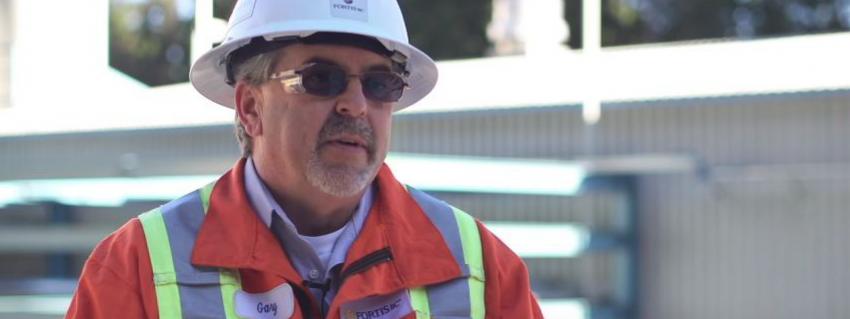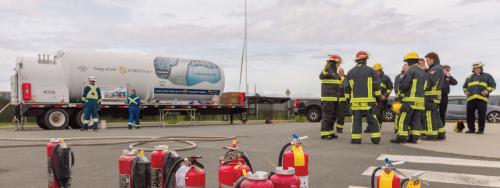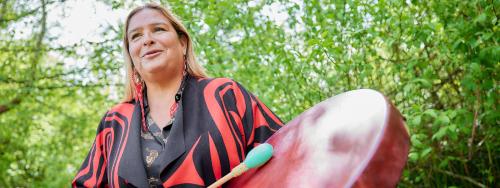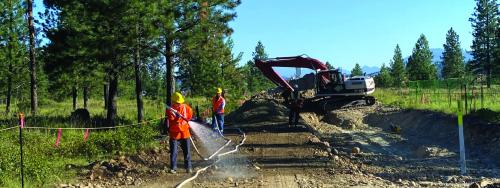Gary Abbott, FortisBC’s Compression, Energy Supply and Resource Development Project Manager
Gary's worked at FortisBC’s Eagle Mountain compressor station in Coquitlam for 22 years, and currently he directs engineering and environmental consultants who are working on designs for the proposed Eagle Mountain – Woodfibre Gas Pipeline project.
How did you get into the natural gas industry?
By accident. I grew up in the Lower Mainland and when I was 21 I went north, seeking my fortune in Fort St. John. I started my career as an apprentice millwright in 1978, and at the time I didn’t really know what a natural gas transmission pipeline or compressor station was.
What kinds of qualifications are required to do this work?
I’ve obtained too many trade certifications over the years to list them all, but to name a few: Red Seal Inter-provincial Journeyman Millwright Certificate, Class B Gas Fitter License and certification as a
gas turbine technician. I’ve also taken numerous management, project management and environmental management courses.
Other than overseeing the compressor station design process, what else does your job involve?
When we’re proposing a pipeline expansion, there’s a detailed process FortisBC goes through to ensure we’ve addressed all the potential public safety, environment and community concerns and that we obtain the necessary permits and approvals from government regulators and local First Nations. Part of my job involves meeting with local First Nations councils, municipal mayors and districts and their engineering staff.
I also attend public open houses to answer questions from local residents, and respond to questions and information requests that come through the BC Environmental Assessment Office’s process to obtain our provincial Environmental Assessment certificate. For this project, we’ve responded to 460 information requests.
What do people need to know about compressor stations?
When natural gas travels great distances through transmission pipelines, the pressure and flow is reduced. We need compressor stations to keep the pressure up and keep the gas flowing through the pipeline.
This allows us to deliver natural gas to thousands of customers who rely on that energy to heat their homes, operate pulp and saw mills, power natural gas vehicles and generate electricity in remote
communities.
FortisBC has 11 compressor stations in communities across the province. How are people in these communities affected by the compressor stations?
FortisBC has a 40-year history of safely operating compressor stations in BC. Most folks aren’t even aware of these facilities in their community, but they benefit from them because municipalities receive substantial property taxes for these compressor stations and FortisBC uses many local business services to maintain and operate them.
What are the biggest misconceptions about compressor stations?
That they’re unsafe, noisy and smelly. I’ve worked in and lived near compressor stations for more than 37 years and never experienced a significant safety incident at any of the compressor stations. There's no odour, and I can only hear the compressors when I'm right at the station.
One of our compressor stations is in Coquitlam, located near a residential neighbourhood and a golf course. It’s been operating for over 25 years, and I doubt many Coquitlam residents even know it’s there. A lot of people who live in the area take their dogs for walks right by the facility.
What do you enjoy about your job?
This work has allowed me to grow and advance well beyond anything I could’ve imagined back when I started. The natural gas industry has provided a very comfortable and secure life for me and my family, living throughout BC from Fort St. John to Vancouver Island and many places in between.
I’ve met many truly talented and dedicated people who’ve mentored and encouraged me along the way, which I try to do for others. The crews I’ve managed over the years have not only been great employees, they’ve been great neighbours and contributors for their community, both as off-duty volunteers and public ambassadors while on-duty. I remember one instance in particular when a mountain biker showed up at the gate outside the Eagle Mountain station, seriously injured. Our crew gave him first aid and called an ambulance. And we’re always being asked to help find lost dogs near that station—we’re happy to help whenever we can.



